|
|
|
Sort Order |
|
|
|
Items / Page
|
|
|
|
|
|
|
| Srl | Item |
| 1 |
ID:
116858
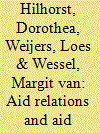

|
|
|
|
|
| Publication |
2012.
|
| Summary/Abstract |
This paper considers mutual imaging of aid workers and Bhutanese refugees in Nepal. Based on a theoretical perspective of aid as a socially negotiated arena, the contextual and interactionist concept of imaging is used, rather than labelling (which is done to people), or perceptions (located in one actor's head). The paper uses a Q-methodology that symmetrically researches different groups of actors by posing the same questions. Our data confirm that the distinctions between the way aid workers and recipients view themselves, each other and the aid provided were more gradual than clear-cut between categories and that the legitimacy of aid workers is not determined by the perceived quality of aid. Problems with routinised aid were not translated into negative images, whereas problems with new and irregular types of aid were. Our research indicates the importance of the interaction between implementing staff and active beneficiaries. The roles of these active volunteers and incentive workers are important but ambiguous. They may smooth the divide between aid agencies and clients, but their proximity to the aid regime may also lead to tensions. The way these roles are played out and the effect this has on imaging and aid legitimacy is an area for further research.
|
|
|
|
|
|
|
|
|
|
|
|
|
|
|
|
| 2 |
ID:
152796
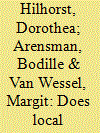

|
|
|
|
|
| Summary/Abstract |
In international development, shared ownership is assumed to be a condition for effectiveness. Academic studies question this relation, claiming shared ownership can instead lead to ineffectiveness. This study analysed the interplay between ownership and effectiveness in a transnational advocacy network for conflict prevention observed 2012–2015. Building on recent discussions about balancing unity and diversity in networks, this article unpacks the ownership/effectiveness relationship into three dimensions: collective identity, accountability processes and a shared advocacy message. We find that the question is not about more or less effectiveness, but about the processes shaping the meaning of effectiveness in particular institutional constellations.
|
|
|
|
|
|
|
|
|
|
|
|
|
|
|
|
| 3 |
ID:
096123
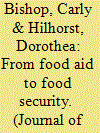

|
|
|
| 4 |
ID:
164839
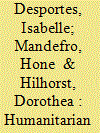

|
|
|
|
|
| Summary/Abstract |
This article aims to rekindle the debate on the politics of aid in the increasingly common – yet still under-studied – authoritarian and low-intensity conflict settings, detailing the case of Ethiopia in 2016, when a 50-year drought coincided with a wave of protests and a state of emergency. During four months of qualitative fieldwork in 2017, state, civil society, Ethiopian and international actors were approached – from humanitarian headquarters to communities in the Amhara, Oromiya and Somali regions. Research participants relayed stark discrepancies between the humanitarian theatre's ‘frontstage’, where disaster responders showcase an exemplary response, and its ‘backstage’, where they remove their frontstage masks and reflect on the information, the decision-making monopoly of the state and the intrusion of conflict dynamics into the humanitarian response. In humanitarian research and in policy, a collective conversation is necessary on where to draw the line between respect for governments’ sovereignty and the intrusion of humanitarian principles.
|
|
|
|
|
|
|
|
|
|
|
|
|
|
|
|
| 5 |
ID:
100323
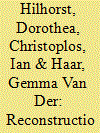

|
|
|
|
|
| Publication |
2010.
|
| Summary/Abstract |
This article examines an emerging approach, called 'reconstruction from below', and its growing body of practice. The article argues that interventions for post-war reconstruction increasingly espouse a commitment to be bottom-up and contextually relevant, to look beyond state institutions, and to provide space for local ownership. The article traces the emergence of this approach to six factors present in international policy. It then examines the growing body of practice in the domains of livelihoods, institution building and basic service provision. It concludes that this approach is not the magic bullet that agencies seem to expect. Reconstruction from below rests on many untested assumptions. Programmes formed pursuant to these notions are often poorly adapted to the challenges encountered and hampered by mistrust of the local institutions to which this approach rhetorically entrusts reconstruction. The large and growing body of evolving experience suggests that it is time to take stock and learn lessons about how reconstruction from below functions in practice.
|
|
|
|
|
|
|
|
|
|
|
|
|
|
|
|
|
|
|
|
|